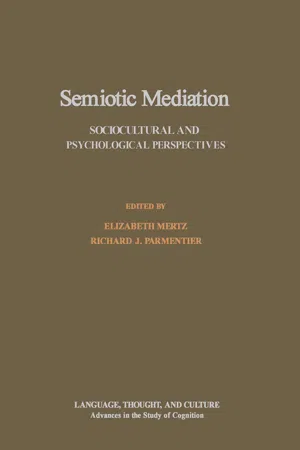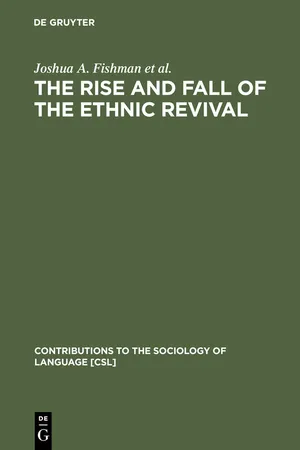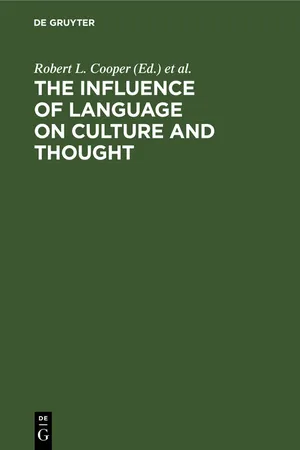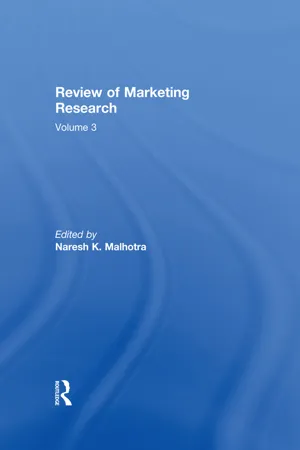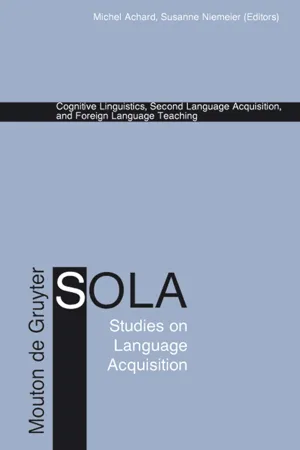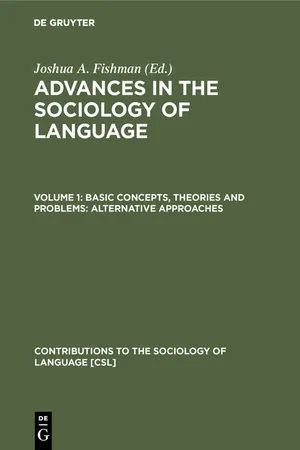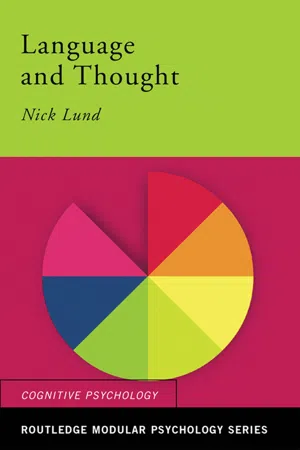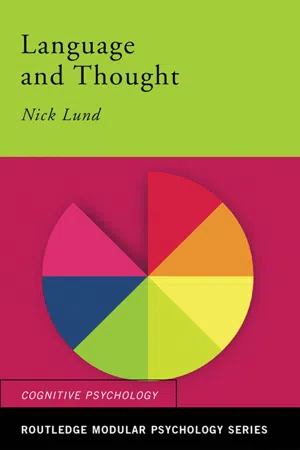Psychology
Benjamin Whorf
Benjamin Whorf was an American linguist known for his theory of linguistic relativity, which suggests that the structure of a language influences the way its speakers perceive and think about the world. This idea, often referred to as the Sapir-Whorf hypothesis, has had a significant impact on the fields of psychology, anthropology, and cognitive science, shaping our understanding of the relationship between language, thought, and culture.
Written by Perlego with AI-assistance
Related key terms
1 of 5
10 Key excerpts on "Benjamin Whorf"
- eBook - PDF
- J.L. Mey(Author)
- 2009(Publication Date)
- Elsevier Science(Publisher)
W Whorf, Benjamin Lee T C Christy , University of North Alabama, Florence, AL, USA ß 2006 Elsevier Ltd. All rights reserved. A self-taught linguist, who also studied American Indian linguistics under Edward Sapir at Yale, Benjamin Lee Whorf is best known for his work in developing the ‘Sapir-Whorf’ or ‘linguistic relativity hypothesis,’ the central claim of which – that the structures of language, in addition to providing a vehicle for the expression of thought, also shape thought by casting it in the mold of language-specific patternings – echoes views advanced in the early 19th century by Wilhelm von Humboldt in his writings on linguistic diversity. In Whorf’s words, ‘‘ . . . the world is presented in a kaleidoscopic flux of impressions which has to be organized by our minds – and this means largely by the linguistic systems in our minds’’ (Carroll, 1956: 213). Whorf’s study of American Indian languages – for example Uto-Aztecan (Aztec and, in particular, Hopi) and Mayan (Maya) – convinced him that the grammatical categories of languages structure both perception and conceptuali-zation. He developed this hypothesis principally in his papers ‘‘Grammatical categories,’’ ‘‘Some verbal categories of Hopi,’’ and ‘‘The relation of habitual thought and behavior to language’’ (1939), all of which are reprinted, along with other of Whorf’s published and unpublished writings, by John Carroll (1956), who, in his introduction to this volume, provided much useful biographical information. The linguistic relativity hypothesis is notoriously difficult to corroborate or refute, with empirical evidence, involving, as it does, the calibration of linguistic with cultural and cognitive considerations. - eBook - PDF
Semiotic Mediation
Sociocultural and Psychological Perspectives
- Elizabeth Mertz(Author)
- 2013(Publication Date)
- Academic Press(Publisher)
One of the more controversial aspects of this issue is whether differences among the various natural languages shape different pat-terns of thought among speakers of these languages. Discussion of this problem (especially in the United States) has centered on the proposals developed in the late 1930s by Benjamin Lee Whorf, a student of native American Indian languages. One reason for the enduring interest in Whorf's ideas lies in the surprisingly small amount of subsequent theoretical or empirical research pro-duced on this topic; we know little more today than we did 40 years ago about the relation of language diversity to thought, or even about how to address this issue productively. Thus, despite their flaws, Whorf's writings remain the single most important theoretical and empirical contribution in this area and should constitute the starting point for any current research. Ironically, given their importance, Whorf's writings have been widely mis-understood both as to their actual content and as to their historical position and significance. These misunderstandings have resulted from a complex in-teraction of underlying disciplinary assumptions, transient historical factors, and, in not a few cases, a simple failure to read the original texts with care. Thus, Whorf's view of language has been seen as limited to a superficial analysis of a few isolated surface forms that he mistakenly believed varied without con-straint across languages. He has been portrayed as arguing that these forms absolutely determine human abilities such as reason and perception, hence as-suring a complete linguistic relativity to which he himself must be victim. In 4. Whorf and Linguistic Mediation of Thought 75 line with these interpretations, any subsequent discovery of either linguistic or cognitive universals has been seen as refuting his views. - eBook - PDF
The Rise and Fall of the Ethnic Revival
Perspectives on Language and Ethnicity
- Joshua A. Fishman, Michael H. Gertner, Esther G. Lowy, William G. Milán, Silvia Burunat, David E. Fishman, Ofelia García, Itzek Gottesman, Phyllis Koling, Rena Mayerfeld, Carole Riedler-Berger, Mark J. Steele(Authors)
- 2013(Publication Date)
- De Gruyter Mouton(Publisher)
Chapter 14 The Whorfian Hypothesis: Varieties of Valuation, Confirmation and Disconfirmation JOSHUA A. FISHMAN In the mid 1930s, an American anthropological linguist, Benjamin Lee Whorf (1897-1941), kindled widespread academic interest in a hypothesis that is in reality a very ancient one insofar as the history of ideas within the Euro-Mediterranean world is concerned. This hypothesis claims that the vastly differently structured languages of mankind lead their respective speakers to vastly different views and experiences of reality, of nature, of life itself. Although this hypothesis had been of interest as far back as Herodotus (who suspected that Egyptian behavior was often opposite to Greek behavior because Egyptians wrote from right to left whereas Greeks [by then] wrote from left to right ), and although it became a theme in such modern European intellectual and literary movements as romanticism, nationalism, the rise of modern anthro-pology and the birth of modern social psychology, it was Whorf who was interpreted by many as having restated it in ways that made it intellectually exciting and, above all, testable for modern American linguists, anthropol-ogists, psychologists, general semanticists and others concerned with the cen-trality of language in human affairs. Indeed, thanks to Whorf, who may actually have been stressing other things (Fishman, Chapter 15, This Volume), this hypothesis has achieved the status of a legend of mankind, i.e., the status of a view that provides insights into the history of ideas more generally and that continues to be stimulating above and beyond its confirmability, above and beyond science, above and beyond empiricism and even rationality per se. No wonder then that the sociology of language, too, has had to face this hypothesis and ponder its meaning and its validity. Let us temporarily set aside the question of whether or not Whorf really intended to say what so many have so long interpreted him as having said. - eBook - PDF
The Influence of Language on Culture and Thought
Essays in Honor of Joshua A. Fishman's Sixty-Fifth Birthday
- Robert L. Cooper, Bernard J. Spolsky, Robert L. Cooper, Bernard J. Spolsky(Authors)
- 2019(Publication Date)
- De Gruyter Mouton(Publisher)
The wax and wane of Whorfian views / . M. Schlesinger 1. Introduction Few beliefs are more cherished and of greater concern to us than the belief that our thoughts are free. Though our actions may be largely constrained by the con-ventions and norms of society, we can always distance ourselves from these, we would like to believe, and are able to pursue any humanly possible line of reason-ing. This conviction has been forcefully attacked by Benjamin Lee Whorf (1956), who remonstrated that the patterns of the language we speak largely determine the patterns of our thought processes and, ultimately, of our culture. Whorf's argu-ments cut to the quick. Fishman (1980: 26) regards Whorf as comparable in some ways to the great debunkers - Copernicus, Darwin, and Freud. Whorf's views sparked much interest, and in the early nineteen fifties a spate of experimental research was carried out bearing on his claims. More recently some disillusionment appears to have set in; as Lakoff (1987: 304) observes, . . . most 'responsible' scholars have steered clear of relativism. It has become a bête noir, identified with scholarly irresponsibility, fuzzy thinking, lack of rigor, and even immorality. Changing attitudes toward Whorf's views seem to have been determined not so much by the results of empirical research but largely by general philosophical conceptions. Whorf claimed that our view of the world is determined by language, and by a curious irony the evaluation of his views on language has been deter-mined largely by the respective writer's world view. In this respect, too, there there seems to be a parallel with Copernicus, Darwin and Freud. Like other great debunkers, Whorf has predecessors. In fact, none of his cen-tral ideas were new with him. The first section sketches the historical development of the views now associated with Whorf's name. - eBook - PDF
- Erika Hoff(Author)
- 2020(Publication Date)
- Cengage Learning EMEA(Publisher)
Language, Culture, and Cognition in Development 247 Copyright 2013 Cengage Learning. All Rights Reserved. May not be copied, scanned, or duplicated, in whole or in part. Due to electronic rights, some third party content may be suppressed from the eBook and/or eChapter(s). Editorial review has deemed that any suppressed content does not materially affect the overall learning experience. Cengage Learning reserves the right to remove additional content at any time if subsequent rights restrictions require it. Language as Providing the Categories of Thought: The Whorfian Hypothesis The Whorfian hypothesis , which was introduced earlier in this chapter, is that language shapes thought. It is also known as linguistic determinism or — in a weaker form — linguistic relativity . This idea has roots in ancient philosophy (Slobin, 1974), but in modern social sci-ence, it is traced to the observations of linguistic anthropologists, in particular to the work of Edward Sapir and his student Benjamin Whorf (see, e.g., Whorf, 1956). As was typical of American linguists in the first half of the 20th century, Sapir studied the languages of native American peoples. He found in his research languages that differed from English both in the way meanings were packaged into words and in the way meanings were encoded in the grammar. For example, in Navaho, the verb form you must use to ask someone to hand you something depends on the shape of the object you are asking for. One verb form is required if the object is long and flexible (such as string), another if it is long and rigid (such as a stick), and a third if it is flat and flexible (such as fabric) (Carroll & Casagrande, 1958, reported in Slobin, 1974). As another example, in the Hopi language, verb forms do not distinguish among the past, present, and future as English verb forms do, but Hopi verb forms distinguish whether the speaker is reporting what he is asserting or expecting what he is asserting. - eBook - ePub
Review of Marketing Research
Volume 3
- Naresh K. Malhotra, Naresh Malhotra(Authors)
- 2017(Publication Date)
- Routledge(Publisher)
Whorf did not describe and measure individual thoughts or behaviors that he could directly relate to the grammatical differences he observed across languages. Rather, he mainly (albeit not exclusively) referred to patterns or differences in language structures that in turn appeared to differentially affect cognitions or behavior. However, because he used the existence of different linguistic expressions to demonstrate the existence of different cognitions or behaviors, his demonstrations have been termed circular (Lyon, 1999). It is clear from his writings, though, that Whorf’s goal was not to prove his hypothesis (principle) through individual-level observations and tests of causality but to build a theory and substantiate it through the use of detailed examples comparing language structures and their consequences on cognitive or behavioral patterns at the aggregate level. As Lucy (1992a, p. 61) observed, “Although the logic of his [Whorf’s] argument is sound, a certain degree of plausibility has been sacrificed in seeking to demonstrate significance.”The linguistic relativity hypothesis has had a significant influence on anthropological, linguistic, philosophical, and psychological research during the past fifty years. Numerous laboratory experiments and empirical cross-linguistic research studies have been conducted, often leading to mixed or controversial results. Oversimplifying somewhat, there have been different phases marked by major research results either confirming or discrediting the linguistic relativity hypothesis. These phases have paralleled what Carruthers and Boucher (1998a) called a belief in the “cognitive conception of language” during the 1950s and 1960s, and a belief in the “communicative conception of language” in the 1970s and 1980s. During the first phase, research results were thought to provide strong support for the linguistic relativity hypothesis. In the second phase, the development of cognitive science and the belief in the commonality of human cognition associated with the discovery of significant universals among a vast array of languages led to the belief that the main function of a language is to communicate thought, with thoughts being independent of their transmission and existing prior to their expression. - Michel Achard, Susanne Niemeier(Authors)
- 2008(Publication Date)
- De Gruyter Mouton(Publisher)
Much of our linguistic behavior can be shown to be based on extralinguistic experiences and cultural knowledge. Even if today Cognitive Linguistics is not as enthusiastic about Whorf's ideas as it seemed to be in its beginnings - because his ideas do not seem to allow for universalist tenden- cies - the interrelation of both research directions is nevertheless certainly a given. 96 Susanne Niemeier 2. Current Trends in Foreign Language Teaching Methodology In foreign language teaching methodology, several new areas of reflection have been developing over the last fifteen years. From a German perspec- tive, I the most promising of these are the concern with awareness raising, the learning objective of intercultural competence, the targets of auton- omous learning, multi-channel learning, holistic learning and teaching, as well as the action-oriented approach to learning. Furthermore, we should also take into account the rather recent focus-on-form approach where we are currently witnessing a movement back from a concentration on mere communicative competence, aiming at reintegrating grammar into the foreign language classroom by combining formal instruction and communicative language use (cf. Doughty & Williams 1998). These approaches and their connection to relativity in language and culture as well as to Cognitive Linguistics will be discussed in more detail below. Suffice it to mention at this point that the above-mentioned trends in foreign language teaching methodology, which are to a certain degree inter- related, also seem to have a relation to Whorf's hypotheses concerning the interconnectedness of language, culture, and thought; and that it is thus a truism to claim that Whorfian ideas should be very much present in today's foreign language classroom. Put in a nutshell, Whorf proposed the idea that language has an influence on our way of thinking and thus on our perspec- tive of reality - or in more "cognitive" terms, on conceptualization.- Joshua A. Fishman(Author)
- 2019(Publication Date)
- De Gruyter Mouton(Publisher)
That the societies using these very different languages differ one from the other in many ways is obvious to all. Is it not possible, therefore, that these socio-cultural differences - including ways of reasoning, perceiving, learning, distinguishing, remembering, etc. - are directly relatable to the structured differences between the languages themselves? The Whorfian hypothesis claims that this is indeed the case (Fishman 1960). Intriguing though this claim may be it is necessary to admit that many years of intensive research have not succeeded in demonstrating is to be tenable. Although many have tried to do so no one has successfully predicted and demonstrated a cognitive difference between two populations on the basis of the grammatical or other structural differences between their languages alone. Speakers of tone languages and of vowel length languages and of many-voweled languages do not seem to hear better than do speakers of languages that lack all of these features. Speakers of languages that code for color, shape and size in the very verb form itself do not tend to categorize or classify a random set of items much differently than do speakers of languages whose verbs merely encode tense, person and number (Carroll and Casagrande 1958). Whorf's claims (namely, that ... the background linguistic system [in other words, the grammar] of each language is not merely a reproducing instrument for voicing ideas, but rather is itself the shaper of ideas, the program and guide for the individual's mental activity, for his analysis of impressions, for his synthesis of his mental stock in trade. Formulation of ideas is not an independent process, strictly rational in the old sense, but it is part of a particular grammar and differs, from slightly to greatly, between grammars 1940) seem to be overstated and no one-to-one correspondence between grammatical structure and either cognitive or socio-cultural structure- eBook - PDF
- Nick Lund(Author)
- 2014(Publication Date)
- Routledge(Publisher)
However, the LRH has become most closely associated with the work of Whorf (1956). He was another linguist LANGUAGE AND THOUGHT 10 The linguistic relativity hypothesis who studied Native American languages and he became convinced that the differences between languages determined the types of thought people were able to have. The theory is often referred to as the Sapir– Whorf hypothesis or, because of the greater influence of Whorf’s ideas, the Whorfian hypothesis . Psychologists have recognised that there are at least two versions of the LRH which differ in emphasis and implications. These two versions of the hypothesis have been labelled ‘strong’ and ‘weak’: • The ‘strong’ version is that language determines thought. • The ‘weak’ version is that language influences thought. Thus the strong version suggests that the language we speak determines the nature of our thoughts, including the types of ideas and concepts we are able to have. It proposes that thoughts that are possible in one language may not be possible in another. The weak version, on the other hand, suggests that language has a more subtle effect on thought and merely influences what we are likely to perceive or remember about an object or event. If you have a word for something in your language you are more likely to recognise and remember it than someone who uses a language that does not have a word for it. More recently Hunt and Agnoli (1991) have suggested an alterna-tive form of the LRH. This is a cognitive approach to the relationship between language and thought which focuses on the computational costs that different languages impose on thinking. In other words, the language you speak makes it easier, and therefore more likely, to think in one way or another. The three versions are discussed below, but before exploring the evidence in detail it should be acknowledged that any version of the hypothesis is difficult to test. - eBook - ePub
- Nick Lund(Author)
- 2014(Publication Date)
- Routledge(Publisher)
He concluded that the differences between the languages changed the way people perceive their environments. However, the LRH has become most closely associated with the work of Whorf (1956). He was another linguist who studied Native American languages and he became convinced that the differences between languages determined the types of thought people were able to have. The theory is often referred to as the Sapir– Whorf hypothesis or, because of the greater influence of Whorf’s ideas, the Whorfian hypothesis. Psychologists have recognised that there are at least two versions of the LRH which differ in emphasis and implications. These two versions of the hypothesis have been labelled ‘strong’ and ‘weak’: Thus the strong version suggests that the language we speak determines the nature of our thoughts, including the types of ideas and concepts we are able to have. It proposes that thoughts that are possible in one language may not be possible in another. The weak version, on the other hand, suggests that language has a more subtle effect on thought and merely influences what we are likely to perceive or remember about an object or event. If you have a word for something in your language you are more likely to recognise and remember it than someone who uses a language that does not have a word for it. The ‘strong’ version is that language determines thought. The ‘weak’ version is that language influences thought. More recently Hunt and Agnoli (1991) have suggested an alternative form of the LRH. This is a cognitive approach to the relationship between language and thought which focuses on the computational costs that different languages impose on thinking. In other words, the language you speak makes it easier, and therefore more likely, to think in one way or another. The three versions are discussed below, but before exploring the evidence in detail it should be acknowledged that any version of the hypothesis is difficult to test
Index pages curate the most relevant extracts from our library of academic textbooks. They’ve been created using an in-house natural language model (NLM), each adding context and meaning to key research topics.

